Question
I have a project in java but in jgrasp it fails several tests. I found the problem to be that I need to create a
I have a project in java but in jgrasp it fails several tests. I found the problem to be that I need to create a TODOList Test object but I'm not exacly sure where to start with it, any help?
Here is the code to work with:
1 /* This class encapsulates a list of user-defined items that should be done- a "TODO" list.
2 * Each item on the list is represented by a String object. 3 * The list is implemented by a String array. The array is initialized in the constructor to an 4 * initial length that is passed to the constructor. The initial array contains only NULL values. 5 * A user adds an item (a String) to the list by calling the addItem method, passing in a String 6 * that represents the to-do item. 7 * Thus, the array may have fewer items (Strings) than its length. 8 * 9 * For example, assume the list has an initial length of 5. It looks like this: 10 * NULL, NULL, NULL, NULL, NULL 11 * 12 * Then, a user adds three items. It looks like this: 13 * "eat lunch", "walk dog", "study Java", NULL, NULL 14 * 15 * The length of the list is 5, the number of items is 3. The NULL values are unoccupied cells. 16 * The capacity of the array is its length. The size of the data stored in the array is less than 17 * or equal to its capacity. 18 * 19 * If a user wants to add more items to a list that has no more NULL values, i.e. no more room, 20 * the expandArray method is called to double the length of the toDoList. The original Strings 21 * are in the same positions, but the new array has double the capacity- more room for adding items. 22 */ 23 public class TODOList { 24 25 /* YOUR Instance variable declarations here. */ 26 private String[] TODOList; 27 private int initialLength; 28 private int numItems; 29 30 /* Constructor that initializes the initialLength variable to the value passed in. 31 * It also initializes the toDoList with the initial length. 32 * Any other instance variables may be initialized as well. 33 */ 34 public TODOList(int initialLen){ 35 this.initialLength = initialLen; 36 this.TODOList = new String[initialLen]; 37 this.numItems = 0; 38 } 39 40 /* Add the item passed in to the end of the list. 41 * For example, if the toDoList list contained: "eat lunch", "walk dog", 42 * the next item added, "study Java", would result in this list: 43 * "eat lunch", "walk dog", "study Java" 44 * Suggestion: use instance variable to keep track of the index of the next available cell. 45 */ 46 public void addItem(String itemStr){ 47 if(TODOList.length > numItems){ 48 TODOList[numItems] = itemStr; 49 numItems += 1; 50 } 51 } 52 53 /* Overwrite the item at "position" to be the parameter "itemStr". 54 * Note: position is a positive integer > 0 that has to be a valid position 55 * in the toDoList. A valid position corresponds to an item stored in the 56 * toDoList. For example, if this was the list: 57 1 walk the cat 58 2 order doughnuts 59 3 go to the gym 60 4 wash dishes 61 * valid positions would be 1, 2, 3, 4. All other integers are invalid. 62 * This method returns true if a valid position was passed in, false otherwise. 63 */ 64 public boolean replaceItemAt(String itemStr, int position){ 65 if(position > 0 && position 0 && numItems > 0){ 81 numItems -= 1; 82 TODOList[numItems] = null; 83 return true; 84 } 85 return false; 86 } 87 88 /* 89 * This method returns the number of items stored in the item list. 90 * The method returns a String array that contains only the items that have been added. 91 * This array does not contain any NULL values. 92 * For example, if the toDoList list contained: "eat lunch", "walk dog", "study Java", NULL, NULL, 93 * the getToDoList method would return an array with these Strings: "eat lunch", "walk dog", "study Java". 94 * If the toDoList does not contain any items, this method returns a String array with zero length. 95 */ 96 public String[] getToDoList(){ 97 int numLoop = 0; 98 String[] result = new String[numItems]; 99 while(numLoop 0){ 152 return false; 153 } 154 return true; 155 } 156 157 /****** Private, "helper" method section ******/ 158 159 /* Creates a new array that is double the size of the array passed in, copies the data 160 * from that array to the new array, and returns the new array. 161 * Note that the new array will contain the items from the previous array followed by NULL values. 162 */ 163 private String[] expandList(String[] inputList){ 164 String[] newArray = new String[inputList.length * 2]; 165 int numLoop = 0; 166 while(numLoop 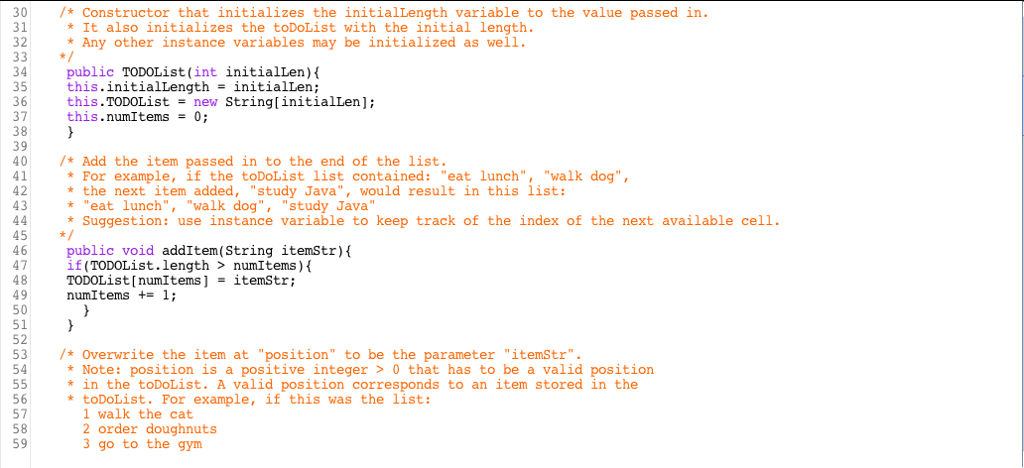
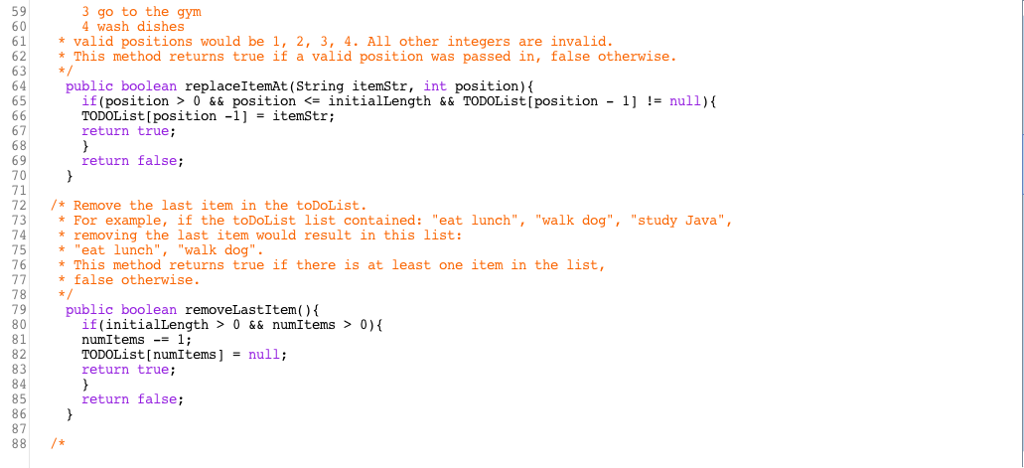
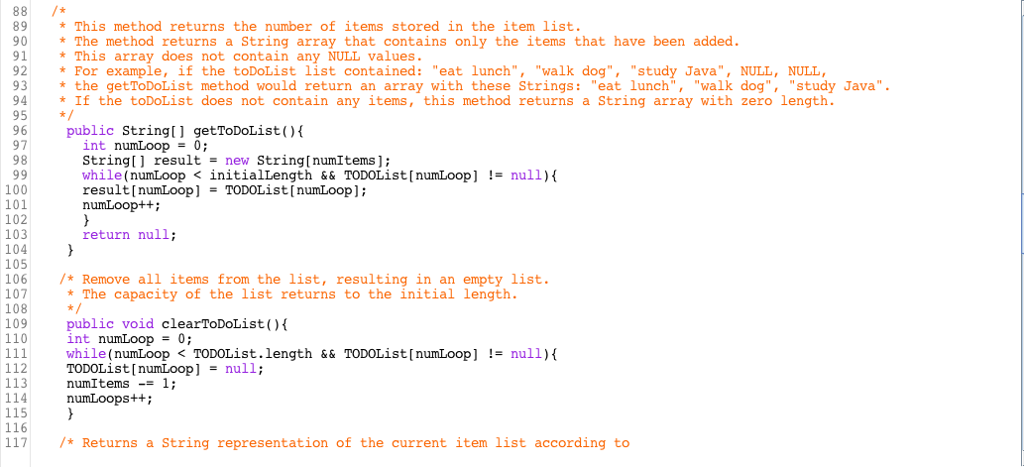
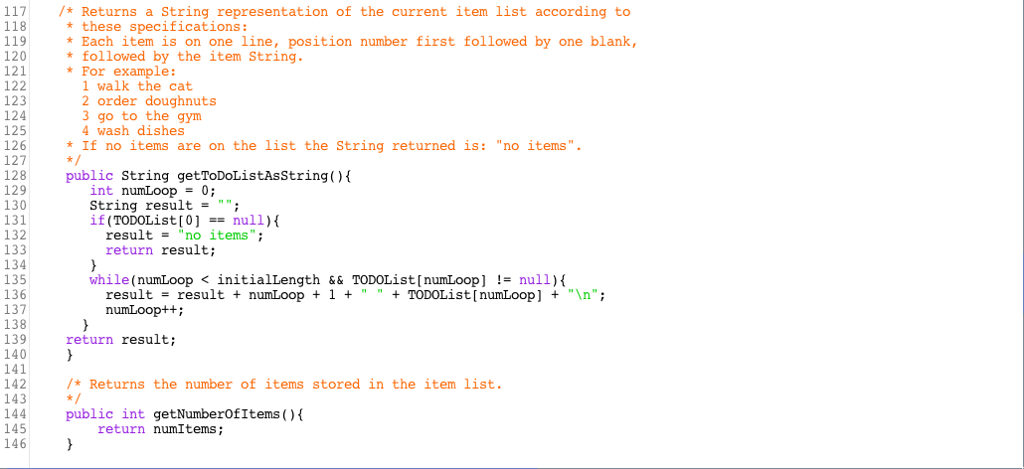
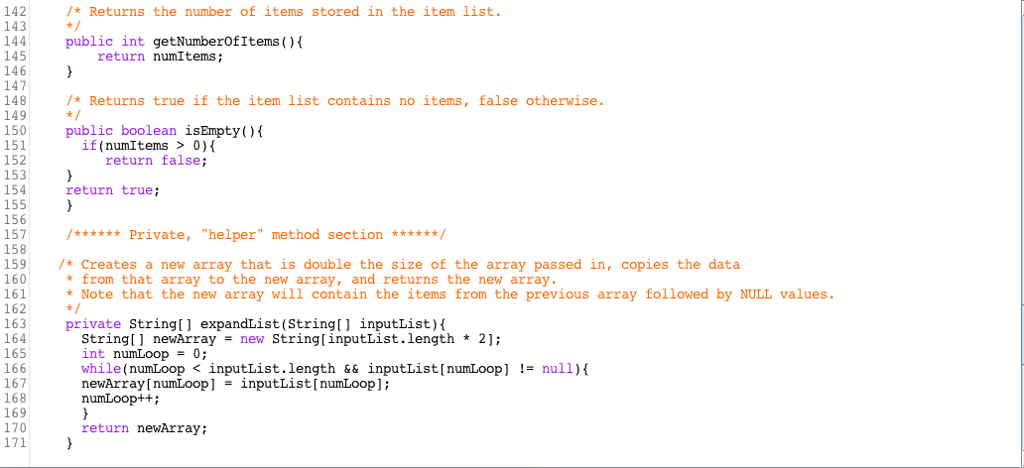
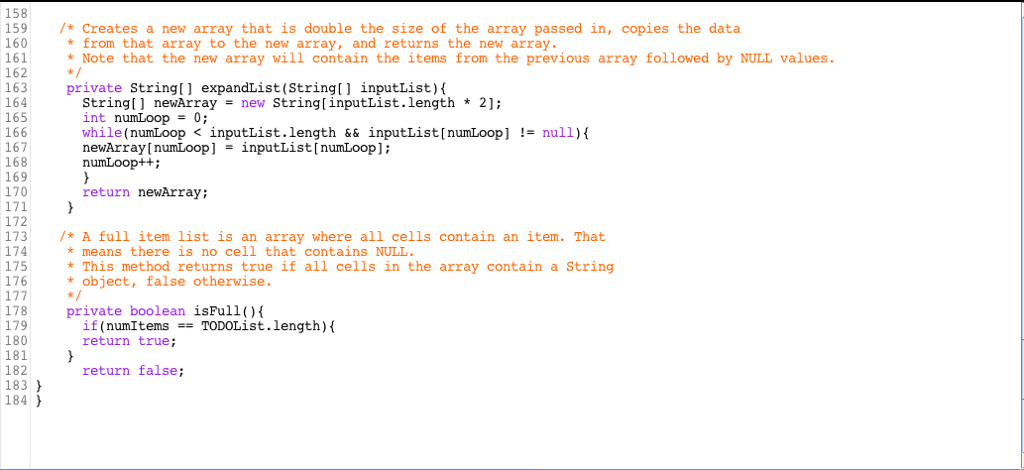
Step by Step Solution
There are 3 Steps involved in it
Step: 1

Get Instant Access to Expert-Tailored Solutions
See step-by-step solutions with expert insights and AI powered tools for academic success
Step: 2

Step: 3

Ace Your Homework with AI
Get the answers you need in no time with our AI-driven, step-by-step assistance
Get Started


